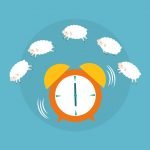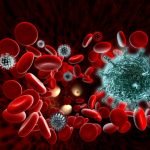How can Naturopathic Medicine be helpful in treating HIV+ patients?
Dr. Leonard, ND
There are three main areas where naturopathic medicine can be of use to HIV+ individuals. The first is in the management of side effects from the medications. While extremely effective in suppressing HIV replication and thus keeping T cell counts up, the medications have many side effects, some severe enough to affect a patient’s compliance with their medication regimen. Compliance with the antiretroviral medications is extremely important, as viral resistance can develop if the medications are not taken regularly. By helping to reduce the side effects, patients are able to continue taking their medications as scheduled, and reduce their risk for developing viral resistance.
Another area where it is possible that naturopathic medicine can make an impact is in extending the amount of time an asymptomatic HIV+ individual can remain off the HAART (highly active antiretroviral therapy) medications. This will be discussed further at the end of the article.
Finally, sometimes it is the role of the naturopathic physician to encourage a patient to begin taking the antiretroviral medications. Some patients have a strong fear of allopathic medicine; either from having a bad experience themselves or from having seen friends suffer severe side effects from the first generation of medications used to treat HIV. For any patient with a CD4 count less than 200, where the potential for life-threatening opportunistic infections starts rising, it is our role to help dispel any myths about the medications that these patients may have. We can assure these patients that the medications to treat HIV have come a long way over the past 20 years, and although there are still side effects, not all patients experience them, and many can be managed with naturopathic medicine. It is important to spend time with these patients, discuss their fears and address each one, while at the same time monitoring them frequently for any signs of illness. By providing accurate and realistic information, and informing them of the risks of not treating their HIV, many patients will find the courage to seek medical care.
What type of information is important to know about HIV+ patients?
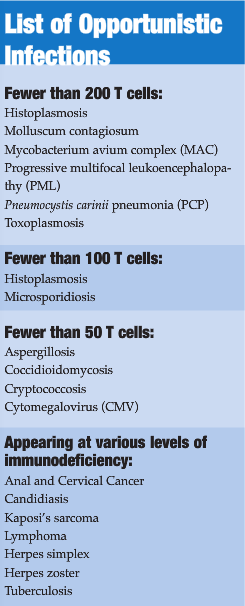 There are several pieces of information that you will want to ascertain in your initial interview with an HIV+ patient. First, and most important, you want to know the patient’s CD4 count and viral load. This will help put into context any physical symptoms the patient may be experiencing, and will change your differential diagnosis. For example, while any respiratory symptoms in a patient should be worked up, you are more likely to suspect Pneumocystis carinii pneumonia in a patient with less than 200 CD4 cells than in one with 400 CD4 cells.
There are several pieces of information that you will want to ascertain in your initial interview with an HIV+ patient. First, and most important, you want to know the patient’s CD4 count and viral load. This will help put into context any physical symptoms the patient may be experiencing, and will change your differential diagnosis. For example, while any respiratory symptoms in a patient should be worked up, you are more likely to suspect Pneumocystis carinii pneumonia in a patient with less than 200 CD4 cells than in one with 400 CD4 cells.
Next, you will want to know if your patient is taking HAART medications or not. The majority of patients with HIV will be taking these medications, but more and more medical doctors are delaying the initiation of starting these therapies due to the number of side effects associated with them. However, once initiated treatment is often lifelong, and side effects can worsen with time. Each of the drugs or drug classes carries with it certain side effects. Knowing the exact drugs will help you predict what side effects your patient may be experiencing, or may help you prevent them from developing.
Finally, you will want to know what symptoms your patient is currently experiencing, so that you can tailor your treatment to cover not only HIV support, but treatment of their current symptoms or medication side effects as well.
What are the common medications used to treat HIV?
The most common starting combination for a patient beginning HAART therapy is two nucleoside reverse transcriptase inhibitors (NRTIs) and a non-nucleoside reverse transcriptase inhibitor (NNRTI). This combination usually carries the lowest side effect profile, and most patients tolerate this combination well. However, some patients develop resistance to the NNRTI class of drugs, and others may have been infected with a virus that is already resistant to the NNRTIs. In this case, 2 NRTIs are combined with one or two protease inhibitors (PIs). These regimens tend to have more side effects. Finally, there is ‘salvage therapy’ for those patients who have multi-drug resistance. These patients will be put on a combination of 4-6 drugs, generally selected after doing resistance testing. They will also likely be taking a fusion inhibitor, the newest class of drug. The fusion inhibitor is currently only available as an injectible medication, and needs to be self-administered by the patient twice a day. These combinations usually carry the greatest side effect profile. It is also important to note, however, that every patient is different, and some on an ‘easy’ regimen may still experience side effects, while some on a very long list of drugs may tolerate them without any problems.
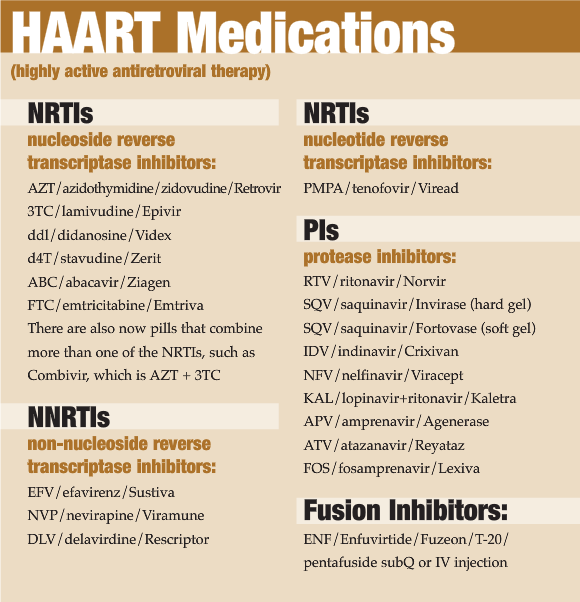 Treating HIV
Treating HIV
A good place to start your treatment plan is with nutrition. Is your patient getting enough protein? In the setting of chronic disease, protein needs can increase to upwards of 150 grams a day, especially if diarrhea or wasting is present. Is your patient getting water from a clean source? Although not as common in the developed country, parasites do still invade our water supply periodically. This can be dangerous for any patient with a low CD4 count. Also, patients should be drinking filtered water to remove any chlorine contamination. Chlorine will add to the already high oxidative stress an HIV+ patient is experiencing. Is your patient’s essential fatty acid intake adequate? Essential fatty acids prevent loss of body cell mass (BCM), and decrease the risk of progression to AIDS. Is your patient smoking or drinking alcohol frequently? Both of these will lead to more rapid progression to AIDS. Finally, is your patient getting enough calories to keep their weight stable? Patients with a lower BCM and wasting have a higher risk of death.
Nutrient deficiencies are common in HIV+ patients. There are more than 12 different nutrient deficiencies common in HIV+ individuals. These include Vitamin A, beta-carotene, folate, Vitamin B1, Vitamin B6, Vitamin B12, Vitamin E, Copper, Magnesium, Manganese, Selenium, and Zinc. Ensuring a good source, high potency multiple vitamin and mineral supplement is important for all HIV+ patients.
In addition, we want to tell or HIV+ patients the same things we tell most of our patients, such as to decrease the intake of sugar, processed foods, fried foods, dairy, and sodium, while increasing the intake of dark green leafy vegetables and other liver supporting foods, and fiber. Working with diet and lifestyle alone can make a great difference in how your HIV+ patients feel, and can lead to increased energy through the ingestion of higher quality foods and nutrients.
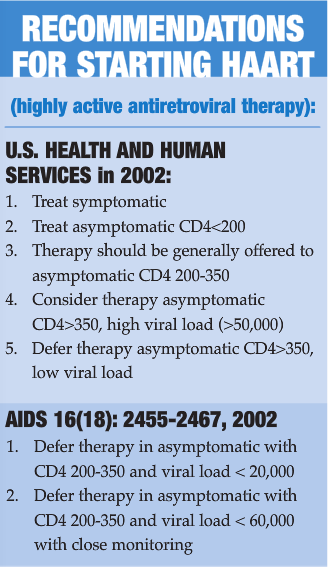 Treating Side Effects
Treating Side Effects
When treating side effects of medication, always start with digestive side effects. If the gut isn’t functioning properly, your patient may not be able to absorb many of the nutrients you give them. Diarrhea is a very common side effect of the HIV medications, and generally responds well to naturopathic treatment. For most patients, high doses of L-glutamine along with the probiotic Saccharomyces boulardii is effective in stopping diarrhea. As the HAART medications can lead to lactose intolerance in some individuals, I recommend a trial elimination of dairy products. I will also add a Chinese herbal formula for more severe cases, to help tonify the spleen (digestive) energy. For cases of stubborn diarrhea or diarrhea that is explosive, or associated with foul smelling gas, I recommend that my patients do a stool analysis to rule out a parasitic infection. Oftentimes if the diarrhea won’t resolve with supplements alone, it is because there is a low-grade infection present.
Liver support is important, as the typical HIV+ patient is taking several medications in addition to the HAART medications, and all of these medications are processed through the liver. A standardized extract of milk thistle or a combination product including milk thistle and curcumin should be sufficient to protect the liver.
Mitochondrial toxicity is another side effect of the medications, which appears to worsen with length of time on the medications. The ‘d class’ of drugs (ddl, d4T) are the worst offenders, although all of the NRTIs produce some degree of mitochondrial toxicity. The d class of drugs is rarely prescribed as a first line of therapy anymore, but they are still used occasionally for patients with multi-drug resistant virus. Syndromes possibly related to mitochondrial toxicity are lipodystrophy and metabolic syndrome, and lactic acidosis (rare). The nutrients CoEnzyme Q10 and Acetyl-L-Carnitine can help optimize mitochondrial functioning.
Acupuncture can be quite helpful in the management of other common side effects. It is particularly effective for nausea, neuropathy, headaches, and myalgia, all of which are commonly seen in HIV+ individuals. It is also quite useful for stress management.
As a practitioner of Chinese Medicine, I often take into account a patient’s TCM diagnosis when strategizing how I am going to treat them. As an example, patients with spleen qi deficiency, which is somewhat analogous to low digestive energy or sensitive digestion, will often have a difficult time digesting too many supplements. For these patients, it is essential to prioritize your treatment strategy, and not to overload them on supplements. I try to use as many non-pill supplements as possible, or have the patient open supplements into a protein smoothie.
Patients Who Are Not Taking HAART Therapy
The area that I am most interested in is treating patients before they initiate antiretroviral therapy. Through the use of diet, lifestyle modification and certain CAM therapies such as nutrient supplementation and Chinese herbal medicine, it may be possible to extend the amount of time that individuals living with HIV can stay healthy and postpone antiretroviral therapy. The theory behind this is that inflammation and pro-inflammatory mediators drive viral replication, and any therapy that can reduce inflammation may delay the progression of HIV. There are no studies at this point which demonstrate that patients who follow a naturopathic treatment protocol or regularly visit an acupuncturist can remain symptom free for longer periods, but it is an area that I believe warrants further investigation.
We are currently conducting a pilot study at Bastyr University investigating the effects of Reishi mushroom in HIV+ individuals not currently taking HAART medications. An earlier in vitro study here at Bastyr showed that Reishi can reduce the levels of the pro-inflammatory cytokine TNF, and reduce levels of NF kappa B. Elevated levels of both TNF and NF kappa B are found in chronic inflammatory conditions and chronic viral infections, and intensify HIV replication. The results of this in vitro work were presented at the 3rd International AIDS Conference on Pathogenesis and Treatment in Rio de Janeiro, Brazil. We should know the results of the pilot study soon. While these results will tell us whether the reduction of pro-inflammatory mediators is also seen in vivo in HIV+ individuals, it will still not answer the question of whether supplementing with Reishi or any other botanical known to reduce inflammation can slow the progression of HIV. It would take a study designed to follow patients over several years to determine the answer to this question.
Co-Infection
The prevalence of HIV+ patients who are also hepatitis C positive is on the rise. In addition to naturopathic therapies to support the liver, I start these patients on a traditional Chinese medicine formula. Studies in China have shown that a certain combination of herbs, known as the ‘anti-fibrosis formula,’ can slow progression of, or even reverse, liver fibrosis. Chinese herbs are also effective at lowering liver enzyme levels. As the anti-fibrosis formula is often included as part of a larger herbal formula that addresses a patient’s constitution, it is best to refer patients to a licensed practitioner of Chinese medicine.
 Dr. Leonard,ND works in the acupuncture/Oriental medicine department at Bastyr Center for Natural Health. She takes a special interest in treating conditions such as HIV/AIDS, other autoimmune diseases, and chronic viral hepatitis. She was invited to speak about reishi at an International AIDS Conference in Brazil and at an annual conference of the American Association of Naturopathic Physicians. She has been in practice for six years and is a member of the AANP and the WAOMA. Dr. Leonard received her ND and MS in Acupuncture/ Oriental Medicine from Bastyr University as well as a certificate for Chinese herbal medicine. She holds a BA in biopsychology from Vassar College.
Dr. Leonard,ND works in the acupuncture/Oriental medicine department at Bastyr Center for Natural Health. She takes a special interest in treating conditions such as HIV/AIDS, other autoimmune diseases, and chronic viral hepatitis. She was invited to speak about reishi at an International AIDS Conference in Brazil and at an annual conference of the American Association of Naturopathic Physicians. She has been in practice for six years and is a member of the AANP and the WAOMA. Dr. Leonard received her ND and MS in Acupuncture/ Oriental Medicine from Bastyr University as well as a certificate for Chinese herbal medicine. She holds a BA in biopsychology from Vassar College.








